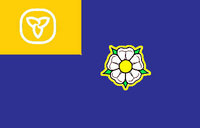New Yorkshire

|

| |
| Subdivision of: | Ontario |
| Cities: | |
| Capital: | Sault Ste. Marie |
| Largest: | Toronto |
| Other: | Windsor, Thunder Bay |
| Languages: | |
| Official: | English |
| Others: | French, Algonquian, Scots, Russian, Romanian, etc. |
| Lieutenant Moderator: | Andrew Urbanczyk |
| Area: | c. 1,000,000 square miles |
| Population: | 5,471,676 persons |
| Established: | 1781, Royal Decree |
| Admission to Ontario: | 1781 (1st) |
New Yorkshire is one of three Districts that make up the NAL province of Ontario. It has the greatest population of the three, and is comprised mostly of descendants from the original English colonists who vied with the French for trade and territory north of the Great Lakes.
The flag is based upon the white rose of the York royal house of England, whose last King was Richard III.
Government
As a result of the Re-Districting Act of 1872, New Yorkshire shares with the other two Ontario Districts the same basic governmental structure:
- A District Council made up of elected representatives who serve for three-year terms. This acts as the district legislature.
- A Lieutenant Moderator elected by direct vote of the district's voters, who serves for one six-year term (technically, the election serves as a nomination process, which leads to the winner's appointment by Ontario's Moderator). This person acts as the district's chief executive.
Administrative Divisions
Although officially the names of the subdivisions of New Yorkshire has always been "Counties," in popular usage they are often referred to as "Ridings."
Algoma | Bruce | Eastman | Glengarry | Gray | Grenville | Honstadt | Leeds | Manitoulin | MacArthur | Parry Sound | Rainy River
TO BE CONTINUED ONCE CERTAIN ASPECTS OF ONTARIO HISTORY HAVE BEEN RESOLVED